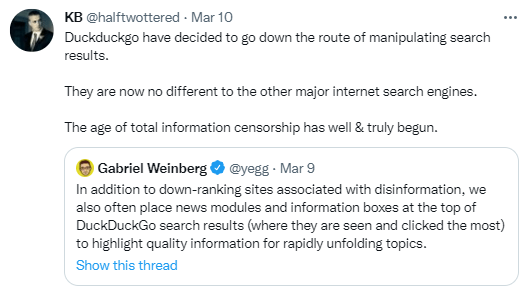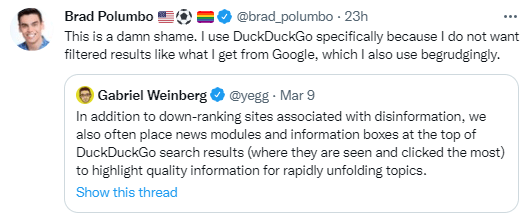from what do you want now ? department
DuckDuckGo, of course, is a popular “alternative” search engine, using Microsoft’s Bing as the underlying search engine, but then doing a bunch of things that are generally good for the internet/at-large audience, like not try to collect as much information about you as possible for tracking-based ads, but instead focusing on intent-based ads around your search (as Google did in the beginning). I use it regularly and appreciate the more privacy-protective approach.
Like many internet companies over the past few weeks, DuckDuckGo has apparently been trying to figure out how to deal with the Russian invasion of Ukraine, as well as the concerted effort by some sources to push a Russian narrative about the invasion. A few days ago, DDG Founder and CEO Gabriel Weinberg announced on Twitter that the company was rolling out a search update that demoted “sites associated with Russian disinformation”.
Now, there are (of course!) reasonable questions to ask about what a particular company considers to be “misinformation”. As we’ve spent years detailing, defining misinformation is much harder than most people realize. It is also subject to abuse by governments seeking to censor. And, quite frequently, misinformation streams are really more closely tied to the issue of confirmation bias.
However, the work of a search engine is of rank websites based on what this website thinks is providing the searcher with the most relevant information. It is, by nature, biased. It is not possible. This is why the whole concept of “research neutrality” is nonsense. A “neutral” search engine is a search engine that only returns random results, rather than useful results. Every search engine is biased because that bias is what determines which results will rank first, second, third, etc.
But one many too performative Trumpists who must always play the victimresponded to Gabriel’s announcement by falling on their passed out couches to lament the fact that a search engine downgraded false information. This includes a Peter Thiel-backed Senate candidate, Blake Masters, who is shocked, shocked, shocked that a search engine could try to downplay false information:
But there were many more, and all of them seemed to be based on the idea that prior to this, DDG results were somehow…pure and unbiased.


















There are SO many more tweets like this, almost all of which seem to think that there is a divine set of search results that are perfect, unbiased, and untouched by human hands, and that somehow Another DDG’s latest search ranking change (something every search engine has ever done in an attempt to continually rank information more relevantly) is contrary to the norm.
It’s truly amazing how few people understand how this all works.
Filed Under: bias, misinformation, research, search engines, search neutrality
Companies: duckduckgo

